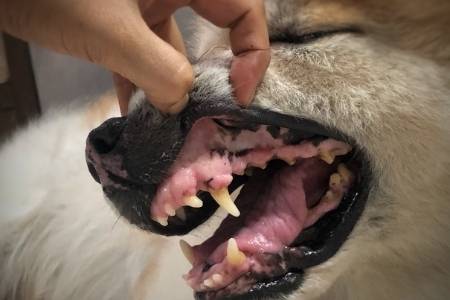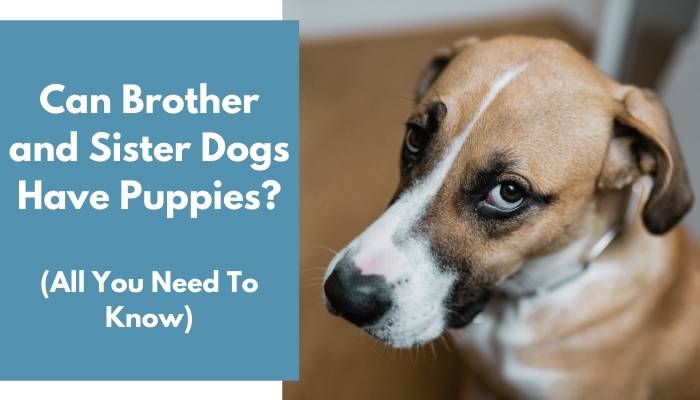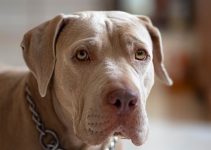There are instances where dog owners interbred their pups of the same litters. Interbreeding their puppies will help the owners predict their appearance and temperament.
Can brother and sister dogs have puppies? Yes, they can have puppies the fact that they can mate and inbreed. Inbreeding in dogs can produce litters with excellent traits but at the same time may cause significant health issues that are detrimental to them.
Dogs of the same litter will likely produce offspring with the same trait. It is beneficial for it keeps the uniformity among genes. Thus, any good quality can be passed on.
However, the danger of inbreeding exceeds its benefits. It can pose a health risk for its litter, such as higher mortality rates, infertility problems, physical defects, etc.
Here are some facts for you to get to know inbreeding as to its signs, effects, legal implications, market value, and why you should avoid it.
Contents
- 1 Can Brother And Sister Dogs Mate And Inbreed?
- 2 What Happens If A Dog Gets Pregnant By Her Brother?
- 3 Is Inbreeding Dogs Illegal?
- 4 Can You Breed Brother And Sister Dogs From Different Litters?
- 5 Can Inbred Puppies Be Normal?
- 6 Signs Of Inbred Dogs
- 7 What To Do When You Have Accidental Inbred Puppies?
- 8 Can You Sell Inbred Puppies?
- 9 Summary
- 10 Resources
Can Brother And Sister Dogs Mate And Inbreed?
Yes, brother and sister dogs can mate and inbreed.
Like any other animal, dogs have instincts when it comes to mating. The moment these dogs are sexually mature, there will be a tendency for them to mate with its sibling.
The process of mating your pups to their closely related species is commonly known as interbreeding. It can be a mother/son, father/daughter, and sibling/sibling mating.
Thus, inbreeding may occur after a sibling dog’s mate and produce an offspring. Dogs with relatives in common can also qualify for this.
In most cases, they are bred by owners to produce predictable positive traits of offspring. There’s an assumption that you will likely make one or even better excellent specimens if you interbreed dogs of the same litters. These remarkable specimens are sought-after by a lot of pet lovers for stud services.
However, interbreeding can stem from a great many potential problems.
This continued interbreeding may limit a particular animal’s gene pool and lose each breed’s potency in the long run. There is a high possibility that these puppies may develop known and unknown inherited disorders.
Brother and sister dogs’ mating and inbreeding can occur naturally and in a selective process. In selective breeding, dogs are likely created from an attractive mutation but small gene pool, resulting in problems.
For the natural occurrence, scientists have found out that once an animal is isolated together with its siblings by geographical and other factors, these animals can be inbred.
What Happens If A Dog Gets Pregnant By Her Brother?
If a dog gets pregnant by its brother, it is most likely called inbreeding.
Inbreeding may bring either detrimental consequences or beneficial results.
It is said that puppies resulting from inbreeding have predictable traits concerning their temperament and physical attributes. This idea can also help fix or homogenize specific dominant characteristics in dogs. It happens due to the increase in the likelihood of passing onto the next generation.
For some dog owners, it gives them peace of mind in rearing their pups. It is because they are sure of what to expect from their pet’s behavior.
On the other hand, inbreeding has real consequences. There is a study that shows a 10% increase in inbreeding can lead to 6% of low growth among its litters. It also decreases its lifespan from six to ten months.
Also, there is a chance of reduced fertility and an increase in abnormalities. Worse, it may result in the extinction of a specific gene.
Another is the dog’s risk for potential diseases. Puppies have weaker immune systems, making them easily susceptible to autoimmune diseases. Common colds or infections may simply cause a dog to become seriously ill.
There are reported cases that inbred litters are challenging to train, less intelligent, and more aggressive. Reasonably, even if dogs do not show negative traits, they may still be a genetic carrier of recessive alleles. Which later on causes negative attributes manifested by their offspring.
Is Inbreeding Dogs Illegal?
In canine species such as dogs, inbreeding, primarily if it naturally occurred, is not illegal.
Unlike humans, inbreeding in canines may happen due to the lack of a dog’s maturity and thus, naturally mates with its sibling, without giving any thought of moral or consequences.
In domestic pets such as dogs, the process of repeatedly mating between closely related dogs is accepted and expected. In fact, it has been a typical practice that has been around for many years.
However, there are still some parts of the world where inbreeding dogs is considered to be illegal. But as for some organizations, leave the decision of inbreeding to the owners.
Can You Breed Brother And Sister Dogs From Different Litters?
Yes, you can breed these sibling pups from different litters. However, it is not recommended.
Dogs that are of related species may be able to produce ideal specimens. If the dog breeder wants to keep a specific desirable trait, they must inbred closely related dogs such as siblings from different litters.
But, since this is just like inbreeding of the same litters, there is still a danger. It poses a risk of selecting genes that can increase the odds of many defects. The closer dogs are related to each other, the more terrible risks are.
It decreases the diversity when it comes to the genetic components of certain breeds. It only means that a disease or defect that runs within the gene pool may continue to be passed on through generations.
Hence, it will give rise to more complex disorders and other health difficulties in the dog’s lineage.
Also Read: How To Unstick A Dog After Mating?
Can Inbred Puppies Be Normal?
There are chances that inbred puppies can be normal. Inbreeding helps to produce ideal litters.
It increases uniformity and fixes desirable traits and breed types. If a dog is homozygous, there is a possibility of producing puppies with the same qualities as they are.
This is why they have greater chances of prepotency, which means that they can pass through their excellent traits to their offspring. It is advantageous for a breeder who is breeding for a specific feature.
However, there are instances where highly inbred dogs most likely show abnormalities. These abnormalities are commonly displayed through their physical characteristics.
Also, inbred puppies have behavior difficulties. They seem to be less intelligent, hard to train and display aggressive tendencies.
Signs Of Inbred Dogs
There are five common signs of inbred dogs. These are the following.
1. Congenital Defects
This is due to hereditary or nutrition-related disorders. Mostly in domestic animals, they have recessive genes for abnormalities.
Some of these congenital disabilities include the odd color of the eyes, nose, hair, skin, etc. Structural and functional congenital defects are typical among inbred dogs.
2. Personality Disorders
It is said that dogs’ characteristics are highly dependent on the genes they have. For inbred dogs, they are known to be impulsive. They tend to run-off chasing a vehicle and then get lost.
Also, they are fearful at the same time. These dogs seem too suspicious when around strangers.
There are also instances where these dogs lack the affection and trust of their owners. They don’t usually display it.
On the contrary, there are some inbred dogs that have separation anxiety. These dogs are always anxious and want the presence of their owners. Inbred dogs also tend to ask for constant affection and attention.
3. Genetic Defects
Most of the inbred dogs are inclined to mutations and conditions. There are also odd behavioral traits present to them.
It includes a high energy level, aggressive tendencies, suspiciousness, and has an attitude of digging holes.
4. Physical Problems
Inbred dogs are most likely to suffer from minor infections, flu, and other serious illnesses. They have a weaker immune system, making them less likely to combat viruses and infections.
5. Fertility Issues
Inbred female dogs will likely deliver unhealthy puppies. It happened when inbreeding went beyond its limitation.
Another is that it influences its hormones. Low levels of these certain hormones will result in abnormalities in the heat cycle, mummification of litters, split heat, etc.

What To Do When You Have Accidental Inbred Puppies?
It can be an undesirable fact, but your dog may still be able to deliver normal and healthy puppies. Thus, the dog will just be fine.
The least that you can do to your pregnant dog is to make sure that it gets the proper nutrition that its body needs. Make sure that your dog will avoid too many strenuous activities. Keep your pet out of reach from your male dog, for it might get injured.
In order to avoid situations like this, you may opt to keep your male and female dogs separated from each other.
It’s unlikely to keep them apart, especially during a mating season where their hormones are at their peak. A practical solution to this is to neuter and spay your dog.
A neutered dog will be likely to reduce hormones responsible for mating. Simultaneously, a spayed female dog will no longer get pregnant. Thus, it will prevent this situation from happening again in the future.
However, if you are a breeder, the solution mentioned above will not fix your problem. Hence, here are options that might work for you.
1. You may opt to increase the number of different sires involved in inbreeding. Logically speaking, the smaller the number, the easier they will be inbred. That is why you might want to consider adding its population.
2. Eliminate your popular sires. They only reduce other breeds’ chance to contribute to the next generation. Hence, they will only distribute dozens of copies of their mutations.
Can You Sell Inbred Puppies?
Yes, you can sell inbred puppies. As a matter of fact, dog breeders use this inbreeding method to increase the likelihood of producing litters with excellent traits.
Most dog breeders want to have a puppy with conformity traits with the breed standards. They said that once the dog meets the breed standards, it is equally saying that the dog has significant chances in the show ring.
Inbreeding helps dog breeders choose the offspring’s desirable traits to achieve a perfect dog. A pup from a good heritage will allow breeders to increase the dog’s market value.
Moreover, it would be helpful to consider the inbreeding coefficient to sell inbred puppies. It represents the probability that a dog may inherit a homologous pair of alleles.
It is recommended that breeding businesses have no higher than a 5% coefficient. A coefficient that is 10% above is too risky. Hence, it is unlikely for these puppies to be sold in the market.
Summary
In summary, indeed, inbreeding will likely improve the dog’s lineage. It can produce a perfect dog by pairing specimens with excellent characteristics.
Many breeders continue to practice this. Inbred dogs with inherited good traits are the most in-demand with a high market value.
However, this method limits the available gene pool. Closely-related animals used for breeding over generations in a single line might pose a risk to their offspring.
This type of breeding may foster a generation of sickly, infertile dogs, shorter lifespan, and even develop potentially fatal weaknesses in their immune system.
Though, there are no legal implications when it comes to inbreeding. It is still both a challenge and significant responsibility for owners to continue this process.
The decision is theirs to make, but potential risks are too significant to avoid inbreeding with their pets.
Ensure properly handling further health-related issues that may occur to puppies born out of inbreeding.
Resources
Image credits – Canva



